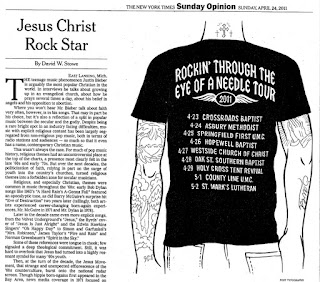How to Write an Op-Ed
David W. Stowe
Why are Ops Ed? Or more to the point, where do they come from? Not so long ago an unexpected opportunity fell into my lap and I became the author of one. In the process I learned some unexpected things about how Op-Eds come to be and the many steps they take to achieve their final form.
One finding: Op-Ed editors are really smart, and the ones I worked with seemed to have a high-level but necessarily ADHD graduate seminar going on in their suite. Second, you will find out what it's like to get your prose thoroughly workshopped to a degree you may not have experienced since undergraduate days--and only if you had a very dedicated composition teacher.
I wrote about all this for the UNC Press website, which asked me for a couple of contributions to mark the release of the paperback edition of No Sympathy for the Devil. An excerpt:
Why are Ops Ed? Or more to the point, where do they come from? Not so long ago an unexpected opportunity fell into my lap and I became the author of one. In the process I learned some unexpected things about how Op-Eds come to be and the many steps they take to achieve their final form.
One finding: Op-Ed editors are really smart, and the ones I worked with seemed to have a high-level but necessarily ADHD graduate seminar going on in their suite. Second, you will find out what it's like to get your prose thoroughly workshopped to a degree you may not have experienced since undergraduate days--and only if you had a very dedicated composition teacher.
I wrote about all this for the UNC Press website, which asked me for a couple of contributions to mark the release of the paperback edition of No Sympathy for the Devil. An excerpt:
Then, nothing for ten days. On April 19 Clay sent me his
revised draft. Recognizably mine but much improved. Still the editorial
prodding went on. The Op-Ed team
wondered what was lost in the split my piece highlighted between secular
and sacred pop music. The question historians dread: “Why should we care,
today?”
They were giving me an opening to weigh in on the current
state of pop music. To render judgment on what I argued was a deeper gap
between secular and religious than existed in the blissfully promiscuous
Seventies, when artists threw in references to God and Jesus at will. But did I
really care that these domains of popular music had diverged so far from each
other? Had anything of value
been lost? I had to admit—no, I didn’t care. The
issue just didn’t stir my pundit juices.
That was fine with Clay. But he wanted my update the next
day. The MSU semester was at its most stressed and hectic but of course I found
time. I realized these folks are never on leisurely academic time; it’s always
daily-deadline pressure.
On April 22 he sent back his edits, along with yet another
Op-Ed Seminar question that was potentially a can of worms. My piece talked
almost exclusively about rock’n’roll; what about black music? This was actually
a perfect opening to make the thing more timely; I was able to weave in a reference
to Marvin Gaye’s What’s Going On,
released almost exactly forty years earlier.
Clay wrote that he was leaving the office, handing me off to
a different editor with yet another fantastic name: Honor Jones. Two days
later, on Easter Sunday, the
piece appeared. I rode my bike to the dairy store to buy a copy. It looked
pretty sharp in print; the online music samples were a huge plus: “Eve of
Destruction,” the Velvet Underground’s “Jesus” (a song I hadn’t known in time
for the book), “Spirit in the Sky,” “For These Tears I Died,” “Superstar,”
Dylan’s “Saved,” and yes, Lady Gaga’s brand new single, “Judas."
To see the rest of my UNC Press piece, go to http://uncpressblog.com/2013/03/20/david-w-stowe-from-the-book-to-the-breakfast-table/


Comments